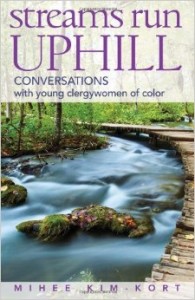For congregations that are serious about responding to the headlines of #MeToo and racialized violence, I highly recommend Streams Run Uphill: Conversations with Young Clergywomen of Color for an adult Lenten book study.
I often hear white adults and predominantly white churches ask, “Where do we begin?” and “Who will teach us?” as they strive to understand experiences & injustices that they know to be critically important but find too overwhelming to ascertain a place to begin. There are many places to enter the intersected conversations of racism and sexism. For an honest, confessional reckoning during the season of Lent, Streams Run Uphill is one such entree that pushes us all as the Church toward the Kingdom of God.
When Streams Run Uphill was first released, I reflected:
 I feel simultaneously encouraged and disheartened by the stories shared by clergywomen whose divine call and ministerial leadership were/are received by the Church through the harsh filters of racism, sexism, ageism, and general xenophobia. Through their stories and their ministries, these clergywomen are leading the way toward a vision of wholeness as one diverse Body of Christ. In order to follow their lead, Streams Run Uphill is a must-read.
I feel simultaneously encouraged and disheartened by the stories shared by clergywomen whose divine call and ministerial leadership were/are received by the Church through the harsh filters of racism, sexism, ageism, and general xenophobia. Through their stories and their ministries, these clergywomen are leading the way toward a vision of wholeness as one diverse Body of Christ. In order to follow their lead, Streams Run Uphill is a must-read.
For small groups and adult ed classes that read Streams Run Uphill for Lent, I recommend the following seven-session outline of reading & discussion for weekly meetings:
- Read the Foreword, Prologue, and Introduction. That’s it. Dip your toes into the book, and pay attention to your responses as a reader. Are you anxious as you start a book that wrestles with the Church? Do you feel asea in this conversation about racism, finding words or references you don’t understand, worrying that you need to know the full history of racism in order to read & discuss this particular book on racism? Reflect together as a group: What do you hope for the experience of reading this book? What do you hope for your own congregation and for the Church at large?
- Read & discuss chapters one and two: “Embracing Womanhood” and “Where Are You Really From?”
- Read & discuss chapters three and four: “You’re How Old?” and “Finding Your Place.”
- Read & discuss chapters five and six: “We Need You” and “Living a Paradox.”
- Read & discuss chapters seven and eight: “The Other Pastor” and “What’s My Passion?”
- Read & discuss chapters nine and ten: “Can You Hear Me Now?” and “Here I Am.”
- Read the Epilogue and Afterword. Spend time individually reflecting on your experience of this book, its impact on your worldview and faith, and the convictions it has stirred within you. How will you turn those convictions (emotions) into commitments (actions)? Ask similar questions as a group: “What do we believe because we have read Streams Run Uphill? What will we now do — individually and/or together — to resist and upset racism & sexism in our congregation, in our community, in the Church? How will we hold one another accountable to these commitments?”
Studying Streams Run Uphill during Lent is an excellent, confessional step in the ongoing work of predominantly white congregations to address racism and sexism, both internally and externally.
Want to read more? For those who facilitate a predominantly white group through an extended conversation on racism, I recommend The Anti-Racism Cookbook, a practical guide with concrete tools for helping a group hear & process its biases and perceptions in conversation. For those who are looking for more autobiographical books to be exposed to stories they might otherwise not be hearing in their daily lives & circles of family/friends, I’m looking forward to the May 2018 release of No Ashes in the Fire: Coming of Age Black & Free in America by Darnell Moore, and I encourage you to put it on your “to read” list as well.
